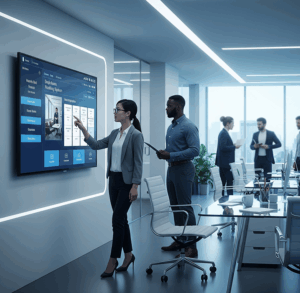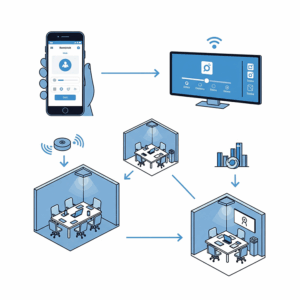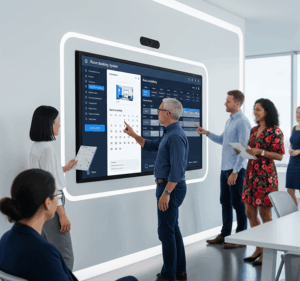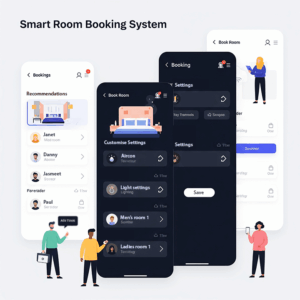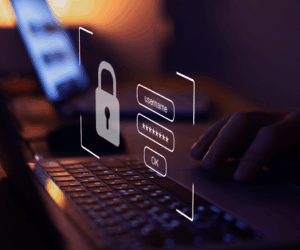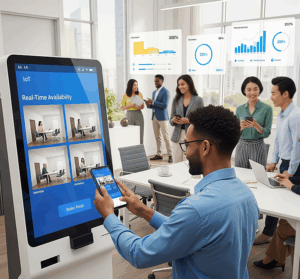
News & Updates

Room Booking & IoT: Smarter Workspaces
Room booking integration with IoT is reshaping the way organisations manage their workspaces in 2025. As the demand for agile, efficient, and data-driven environments grows, IoT-powered booking systems have emerged as the gold standard for smart workspace management. Today’s businesses expect seamless scheduling, real-time occupancy insights, and a user experience that adapts to dynamic workplace needs. This article unpacks how IoT-driven room booking is delivering on those expectations, creating intelligent offices that boost productivity, reduce costs, and support environmental goals. We will also examine how advanced solutions like ATT™’s Online Resource Booking System (ORBS) are helping facility managers and employees alike to realise the full potential of connected, collaborative, and future-ready workspaces.
Whether you are overseeing a corporate office, a healthcare facility, or a public sector building, the integration of IoT into your room booking processes can transform both day-to- day operations and long-term resource planning. Read on to discover the latest trends, practical benefits, and actionable strategies for making your workspace smarter and more responsive in 2025.
The Rise of IoT-Driven Room Booking: Market Trends for 2025
IoT adoption in workspace management is reaching new heights. In 2025, global spending on smart office technology is projected to surpass USD57 billion, with room booking integration standing out as a pivotal element for businesses seeking operational excellence.
Organisations are moving rapidly towards automated scheduling, leveraging real-time occupancy data, and prioritising solutions that not only optimise costs but also advance sustainability agendas. This evolving landscape is especially evident in sectors such as healthcare, government, and corporate offices, where efficient space utilisation and seamless user experiences are directly linked to productivity and compliance.
Facility managers are now expected to deliver on both financial efficiency and employee satisfaction. IoT-driven booking systems answer this call by integrating a range of smart technologies from sensors and analytics to AI-powered scheduling engines into everyday operations. The resulting shift is transformative: workspaces become more adaptive, energy consumption is reduced, and resource allocation is finely tuned to real demand. For digital- first organisations, these capabilities are no longer a luxury but an operational imperative that underpins competitive advantage.
Automation Meets Experience: User-Centric Booking
Today’s smart booking platforms combine IoT sensors with intuitive digital interfaces, creating an effortless experience for end-users. Employees can check room availability and make reservations instantly from their mobile devices or office desktops. Behind the scenes, IoT sensors monitor real-time occupancy, ensuring that double bookings and empty meeting rooms are minimised. According to Gartner, the deployment of IoT-driven booking solutions has led to a 28% rise in workspace utilisation rates, a clear indicator that both operational effectiveness and employee satisfaction are improving in tandem. These platforms reflect a shift towards employee-centric environments where technology adapts to the way people work, not the other way around.
This user-first approach also reduces friction in day-to-day operations, allowing staff to focus on collaboration and productivity rather than administrative hassles. With automation handling the background processes, the booking experience becomes seamless, reliable, and responsive to the evolving needs of modern teams.
Data-Driven Management: Analytics for Space Optimisation
IoT-enabled systems excel at capturing and analysing detailed usage patterns across all workspace assets. Facility leaders now have access to real-time analytics dashboards that reveal how, when, and by whom rooms are used. This data empowers them to allocate resources dynamically, matching available space to actual demand rather than static schedules. Such evidence-based management leads to tangible reductions in operational overheads and supports environmental, social, and governance (ESG) initiatives by highlighting underutilised areas and enabling targeted improvements.
For example, ATT’s Online Resource Booking System provides granular reporting functions that support ongoing optimisation. Facilities can benchmark utilisation, adjust cleaning schedules, and plan future expansions or contractions based on actual needs rather than assumptions. Over time, this approach fosters a culture of continuous improvement, driving both sustainability and cost efficiency throughout the organisation. Interested in finding out more?
Connect with us at infosoft-sales@attsystemsgroup.com
Seamless Integration: Connecting Room Booking with Enterprise Systems
The smart workspace of 2025 is built on interconnected systems designed to eliminate silos and manual intervention. Room booking solutions are now expected to integrate effortlessly with a host of enterprise platforms, ranging from calendar apps and HR systems to access control and environmental management tools. This interconnectedness delivers a frictionless workflow for both users and administrators, ensuring that every touchpoint, from reservation to room entry, is synchronised and secure.
By enabling different systems to ‘speak’ to each other, integration unlocks new efficiencies and adds real business value. Staff can book rooms directly within their preferred office suite, while administrators benefit from centralised oversight and automated processes that reduce the risk of errors. For organisations with multiple sites or high footfall, such as hospitals or government service centres, integration ensures consistency and reliability at scale, ultimately supporting better resource planning, compliance, and user experience.
Unified Scheduling: Syncing with Office Suites and Calendars
IoT-enabled room booking platforms now offer deep integrations with popular office software such as Microsoft 365 and Google Workspace. This means users can reserve meeting spaces directly from their familiar email or calendar applications, with all bookings reflected instantly across devices. Backend APIs handle the synchronisation, ensuring that room availability is always up to date, regardless of where the booking originated. The result is a seamless scheduling experience that minimises double bookings and reduces no-shows, freeing up time and boosting overall productivity across teams.
Access Control and Security: Smart Entry Management
Security and convenience go hand in hand in today’s smart offices. Integrating room booking platforms with IoT-enabled access control means that only authorised individuals can enter reserved spaces at the right times. Smart locks, QR codes, or digital credentials replace
manual sign-in sheets, simplifying the check-in process while enhancing building security. ATT’s Visitor Management System (VMS) and Online Resource Booking System (ORBS) are designed with these integrations in mind, enabling secure, automated workflows that take users from booking to entry without unnecessary friction or risk. This not only improves user experience but also strengthens compliance with workplace safety protocols.
Resource Automation: Linking to Lighting, HVAC, and AV
The integration of IoT room booking systems with environmental controls is driving a new era of automated, energy-efficient workspaces. When a meeting is scheduled, systems can automatically adjust lighting, HVAC, and AV equipment to ensure the room is ready when participants arrive. Once the booking ends, these resources are powered down, conserving energy and reducing costs. Organisations that have embraced this level of automation report up to 30% savings on utility bills, while also meeting increasingly stringent sustainability targets. For facility managers, this translates into both operational simplicity and demonstrable progress towards corporate ESG objectives.
Automated resource management is particularly valuable in large or multi-site organisations, where manual oversight of environmental settings is impractical. The result is a consistently comfortable, productive, and sustainable workspace for every user, every day.
Real-Time Occupancy and Environment Sensing
At the heart of IoT-powered workspaces are smart sensors that provide real-time visibility into occupancy and environmental conditions. In 2025, these technologies are indispensable for organisations seeking to maximise space usage, ensure compliance, and enhance the well-being of staff and visitors. By continuously monitoring how and when spaces are used, facility managers can make informed decisions that balance comfort, safety, and operational efficiency.
Real-time sensing also enables rapid response to unexpected changes such as sudden increases in occupancy or environmental shifts, supporting a more adaptive and resilient workplace. For sectors with strict regulatory requirements, like healthcare or finance, these capabilities help maintain compliance and foster trust among stakeholders.
Occupancy Sensors: Reducing Under-utilised Space
Occupancy sensors detect presence and movement within meeting rooms and shared spaces, enabling organisations to identify and address underutilisation in real time. If a reserved room remains unoccupied, the system can automatically release the booking and make the space available to others. This dynamic management approach has led facilities to report up to 40% improvements in room utilisation rates. By ensuring that every space is used efficiently, organisations can accommodate more meetings, reduce pressure on high- demand rooms, and avoid unnecessary expansion or leasing costs.
Air Quality and Environmental Monitoring
Modern IoT platforms go beyond occupancy to monitor air quality, temperature, humidity, and other environmental factors continuously. If certain thresholds are exceeded, such as CO2 levels rising or temperatures drifting from optimal ranges, the system can trigger automatic adjustments or send alerts to facility managers. This proactive approach supports health and well-being for all users, which is especially critical in regulated environments like healthcare or finance, where environmental compliance is non-negotiable. By maintaining optimal conditions, organisations safeguard both operational continuity and the comfort of their workforce.
Personalisation and User Experience in Smart Booking
Personalisation is rapidly becoming a hallmark of smart workspace technology. In 2025, IoT and AI work together to create adaptive, intuitive booking experiences that anticipate user needs and drive both productivity and satisfaction. No longer limited to simple reservations, modern platforms provide predictive recommendations, location-aware services, and seamless touchless interactions, making every encounter with the workspace more intelligent and enjoyable.
For facility managers, these personalisation features translate into higher engagement, improved feedback, and a continuous cycle of service enhancement. For end-users, the result is a booking experience that feels tailored and responsive, whether working onsite or remotely.
AI-Driven Recommendations: Anticipating User Needs
AI-powered algorithms analyse each user’s past booking patterns to suggest the most suitable rooms, times, and configurations for future meetings. This predictive capability helps individuals and teams quickly find the best space for their needs, reducing time spent searching and minimising scheduling conflicts. ATT’s ScheduleAI™ module, part of the OAS suite, exemplifies this trend by delivering industry-specific scheduling intelligence that adapts to unique organisational workflows. The end result is a more efficient, less stressful booking process, with higher rates of user satisfaction and resource optimisation.
Mobile and Touchless Interfaces
Touchless technology has become standard in the modern smart office. Users can now reserve rooms, check in, and even adjust environmental settings directly from their mobile devices or through voice assistants without the need for physical contact. This approach supports both hygiene and accessibility goals, a critical consideration for workplaces focused on health and inclusivity. The convenience and speed of mobile and voice-driven interfaces further encourage adoption, ensuring that technology serves as an enabler rather than a barrier to productivity.
Feedback Loops: Continuous Improvement from User Input
Smart booking platforms increasingly incorporate feedback mechanisms that prompt users to rate their experience and suggest improvements after each booking. This real-time data is invaluable for facility managers, who can use it to identify recurring issues, adjust policies, and enhance room features based on actual user needs. The cycle of feedback and improvement fosters a responsive workplace culture, where both technology and services evolve in step with user expectations. Over time, this approach drives continuous innovation and helps organisations maintain a competitive edge in delivering workplace excellence.
Security, Compliance, and Data Privacy in Connected Workspaces
As workspaces become more connected, the stakes for security, compliance, and data privacy rise accordingly. In 2025, IoT-enabled room booking systems must adhere to rigorous standards that protect user information and ensure regulatory compliance, particularly in sensitive sectors such as healthcare, government, and finance. With regulations tightening worldwide, organisations cannot afford to overlook these critical aspects of digital transformation.
Modern platforms are designed with security and compliance at their core, incorporating advanced encryption, granular privacy controls, and comprehensive audit trails. For clients of ATT Group, the assurance of ISO-certified systems adds another layer of trust, ensuring that every deployment meets the highest industry standards for safety and accountability.
Data Encryption and Privacy Controls
End-to-end encryption is now a baseline requirement for protecting booking data and user information, both in transit and at rest. Configurable privacy settings allow organisations to determine who can access sensitive usage data, supporting compliance with local and international regulations such as the Personal Data Protection Act (PDPA) and GDPR. These controls are essential for maintaining user trust and safeguarding organisational reputation in an increasingly data-driven world.
Audit Trails and Regulatory Readiness
IoT-based booking platforms generate comprehensive logs of every booking and access event, creating an auditable record that supports internal reviews, incident investigations, and regulatory reporting. This level of transparency is crucial in high-compliance environments, where the ability to reconstruct and verify events is often mandated by law.
ATT’s suite of ISO-certified solutions ensures that clients are always prepared for audits and can demonstrate adherence to industry regulations, whether operating in healthcare, finance, or the public sector.
Smart Workspace Innovation: What’s Next for Room Booking and IoT
As IoT-integrated room booking becomes the norm, organisations that embrace these technologies stand to gain significant advantages in productivity, sustainability, and employee satisfaction. ATT Group’s solutions, including OAS, VMS, and advanced analytics modules, are engineered to meet the evolving demands of smart workspaces, delivering secure, adaptive, and future-proof environments for clients across industries. To discover how seamless room booking integration can transform your operations and empower your workforce, connect with the experts at ATT through infosoft-sales@attsystemsgroup.com and start shaping the smart workspace of tomorrow.
Send us a message
Contact Information
Address:
35 Ubi Crescent, ATT Building, Singapore, 408585
Phone:
Email:
Website:
www.attsystemsgroup.com



